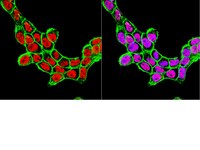A human Dravet syndrome model from patient induced pluripotent stem cells.
Higurashi, N; Uchida, T; Lossin, C; Misumi, Y; Okada, Y; Akamatsu, W; Imaizumi, Y; Zhang, B; Nabeshima, K; Mori, MX; Katsurabayashi, S; Shirasaka, Y; Okano, H; Hirose, S
Molecular brain
6
19
2013
Show Abstract
Dravet syndrome is a devastating infantile-onset epilepsy syndrome with cognitive deficits and autistic traits caused by genetic alterations in SCN1A gene encoding the α-subunit of the voltage-gated sodium channel Na(v)1.1. Disease modeling using patient-derived induced pluripotent stem cells (iPSCs) can be a powerful tool to reproduce this syndrome's human pathology. However, no such effort has been reported to date. We here report a cellular model for DS that utilizes patient-derived iPSCs.We generated iPSCs from a Dravet syndrome patient with a c.4933Cgreater than T substitution in SCN1A, which is predicted to result in truncation in the fourth homologous domain of the protein (p.R1645*). Neurons derived from these iPSCs were primarily GABAergic (greater than 50%), although glutamatergic neurons were observed as a minor population (less than 1%). Current-clamp analyses revealed significant impairment in action potential generation when strong depolarizing currents were injected.Our results indicate a functional decline in Dravet neurons, especially in the GABAergic subtype, which supports previous findings in murine disease models, where loss-of-function in GABAergic inhibition appears to be a main driver in epileptogenesis. Our data indicate that patient-derived iPSCs may serve as a new and powerful research platform for genetic disorders, including the epilepsies. | 23639079
 |
Epidermal growth factor regulates Mcl-1 expression through the MAPK-Elk-1 signalling pathway contributing to cell survival in breast cancer.
Booy, EP; Henson, ES; Gibson, SB
Oncogene
30
2367-78
2011
Show Abstract
Myeloid cell leukaemia-1 (Mcl-1) is an anti-apoptotic member of the Bcl-2 family that is elevated in a variety of tumour types including breast cancer. In breast tumours, increased Mcl-1 expression correlates with high tumour grade and poor patient survival. We have previously demonstrated that Her-2 levels correspond to increased Mcl-1 expression in breast tumours. Epidermal growth factor (EGF) receptor signalling is frequently deregulated in breast cancer and leads to increased proliferation and survival. Herein, we determined the critical downstream signals responsible for the EGF mediated increase of Mcl-1 and their role in cell survival. We found that both Mcl-1 mRNA and protein levels are rapidly induced upon stimulation with EGF. Promoter analysis revealed that an Elk-1 transcription factor-binding site is critical for EGF activation of the Mcl-1 promoter. Furthermore, we found that knockdown of Elk-1 or inhibition of the Erk signalling pathway was sufficient to block EGF upregulation of Mcl-1 and EGF mediated cell survival. Using chromatin immunoprecipitation and biotin labelled probes of the Mcl-1 promoter, we found that Elk-1 and serum response factor are bound to the promoter after EGF stimulation. To determine whether Mcl-1 confers a survival advantage, we found that knockdown of Mcl-1 expression increased apoptosis whereas overexpression of Mcl-1 inhibited drug induced cell death. In human breast tumours, we found a correlation between phosphorylated Elk-1 and Mcl-1 protein levels. These results indicate that the EGF induced activation of Elk-1 is an important mediator of Mcl-1 expression and cell survival and therefore a potential therapeutic target in breast cancer. Full Text Article | 21258408
 |










